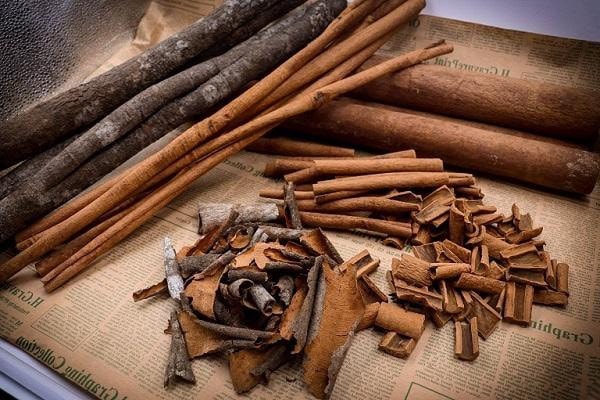Little known effects of cinnamon
Cinnamon is considered one of the four precious medicinal herbs of traditional medicine. It is also a spice in cooking and treats mold in the home.
Oriental medicine considers cinnamon as one of the four precious medicinal herbs: ginseng, velvet antler, cinnamon, and aconite. Vietnam is one of the countries that grows a lot of cinnamon, exporting hundreds of tons of cinnamon bark and dozens of tons of cinnamon essential oil every year.
Cinnamon is a wild tree that grows in the forest, or is planted by seeds or cuttings. It can be harvested after 5 years, but the best time to peel cinnamon bark is after 20-30 years.
The bark is rich in tannins (5%) and contains essential oils (1.2-1.5%), but the essential oils are rich in cinnamic aldehyde (80.85%). There is no eugenol but there are small amounts of cinnamic acid, cinnamyl acetate, and o-methoxycinnamaldehyde; there are also cinnzeylanol and cinnzeylanin.
Traditional medicine has a variety of medicinal uses for cinnamon. According to the latest research, cinnamon also has the effect of preventing diabetes, reducing the risk of heart disease, strong anti-inflammatory, protecting the brain from dementia and cognitive decline, preventing cancer, acne, eliminating bad breath, good for the skin.... Cinnamon has given us many medicinal properties and rich therapeutic applications throughout the history of medicine.
 |
Cinnamon is a precious medicine in oriental medicine, cinnamon bark can be used as a cooking spice. |
In daily life, cinnamon has many applications such as in culinary as a spice,health careand aesthetics such as herbal scented bags, housewarming, shoe insoles...
- Helps you sleep: you can burn cinnamon essential oil and place it in the corner of the room. This will create a mechanism to diffuse the aroma, making the room have a characteristic herbal scent and help you sleep more deeply.
- Treating joint pain: Cinnamon soaked in wine for massage is very good for reducing joint pain. However, be careful not to use too much as it will burn the skin because cinnamon is very hot. You can use a few drops of cinnamon essential oil mixed with a base oil such as coconut oil or baby oil for massage to help relax and stretch the muscles very well.
- Anti-bad breath: You can use dried cinnamon bark or cinnamon essential oil. The aroma of cinnamon will help you have fresh breath. Chewing a piece of dried cinnamon also has antibacterial and anti-inflammatory properties to eliminate tooth decay and other causes of bad breath.
- Reduce flu and cold symptoms: mix a few drops of cinnamon essential oil into a small basin of hot water and steam your face to clear the respiratory tract, cure nasal congestion, and make breathing easier.
- Used for soaking, bathing, steaming: fragrance, warming the body, relaxing the whole body.
- Cinnamon, a spice for many delicious dishes: The aromatic, spicy and sweet taste of cinnamon helps to reduce the fishy and pungent smell of fish and meat, making the dish more flavorful and stimulating the digestive system. It is a spice ingredient for pho, beef noodle soup, cinnamon-flavored cakes, cinnamon sausages, etc.
In addition to the aroma that makes the dish more attractive, the essential oil of cinnamon also helps the digestive system fight bacteria, making the dish warmer, eliminating the cold, helping the eater avoid stomach aches. However, caution should be exercised and used in moderation, using too much cinnamon can cause irritation of the lips and mouth, people allergic to cinnamon should avoid dishes with cinnamon as a spice, and should not eat too much cinnamon because cinnamon is hot, causing an imbalance of yin and yang in the body.
Cinnamon essential oil has antibacterial, antifungal, and antiparasitic effects. Cinnamon essential oil is used to eliminate moldy odors from clothes or damp lime walls, air conditioners, cars, etc. Unpleasant odors that affect the surrounding fresh air will be completely eliminated with cinnamon scented bags. Cinnamon also deodorizes, warms the soles of the feet, and limits foot fungus, also known as candida albicans.
Cinnamon is also an indispensable ingredient in herbal incense used in worship and meditation. Incense with cinnamon as an ingredient is very fragrant, bringing a feeling of warmth and peace. Ingredients for making incense include toothpicks, cinnamon powder, glue powder... Depending on the mixing method, it creates different special scents.




.png)



